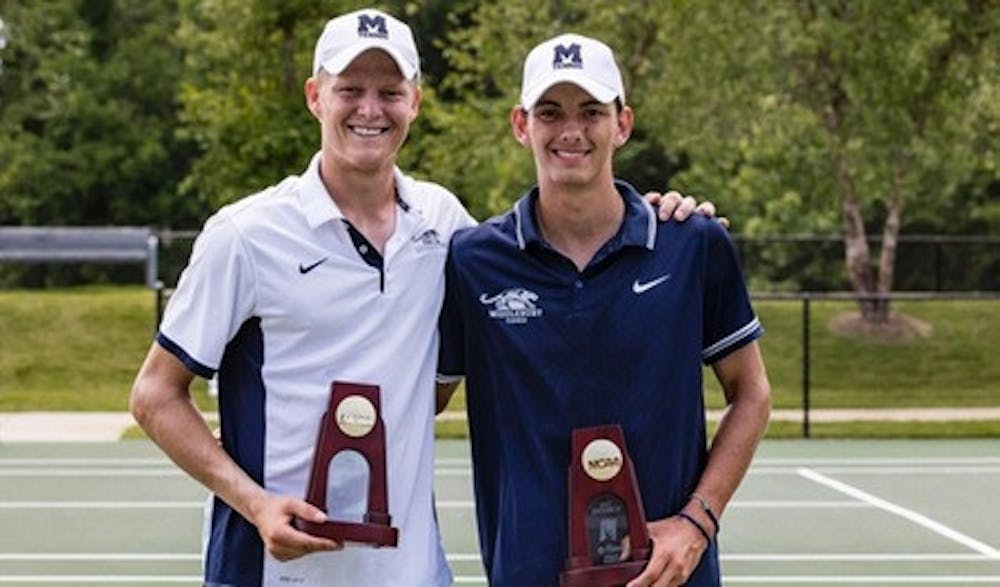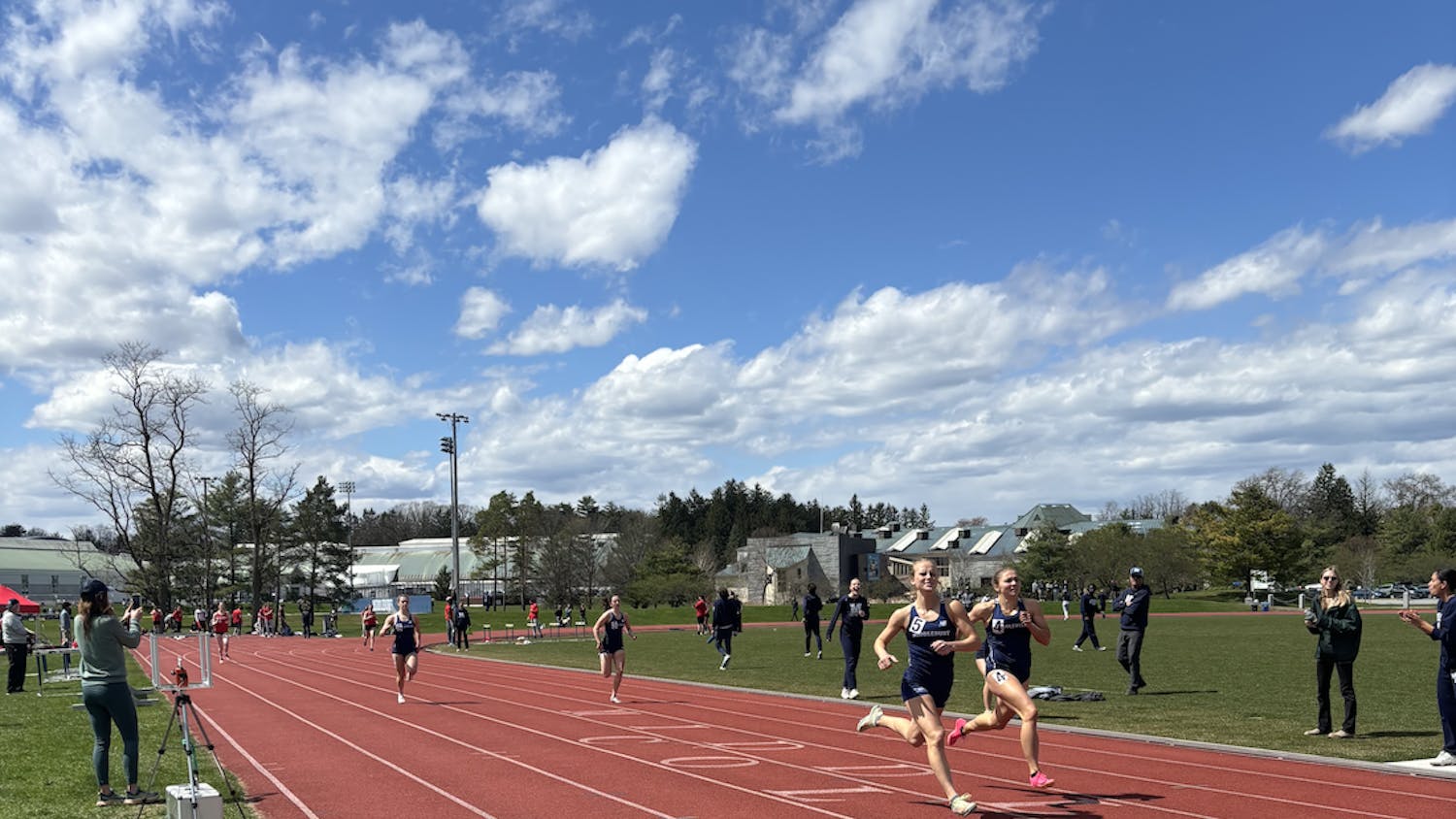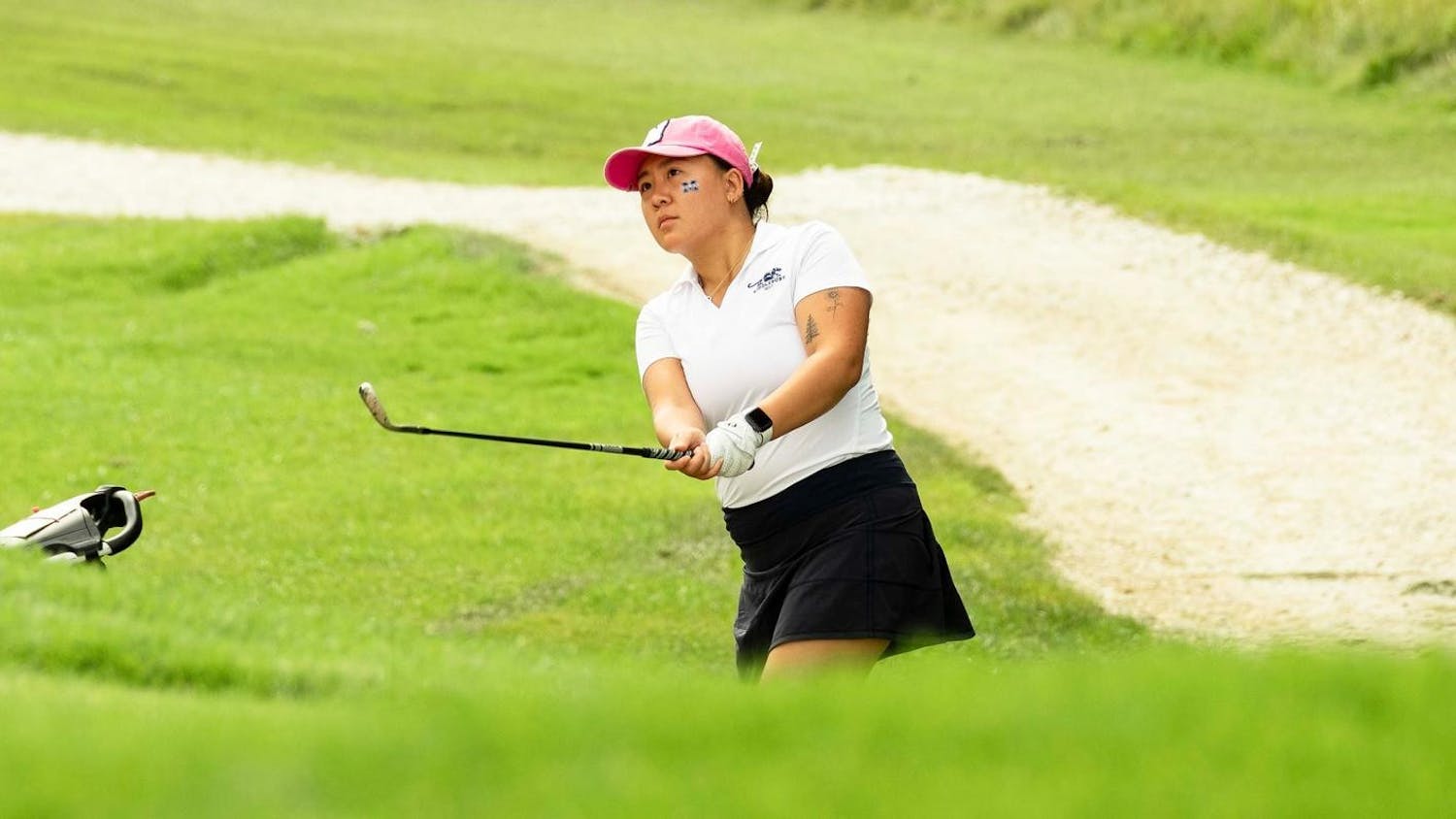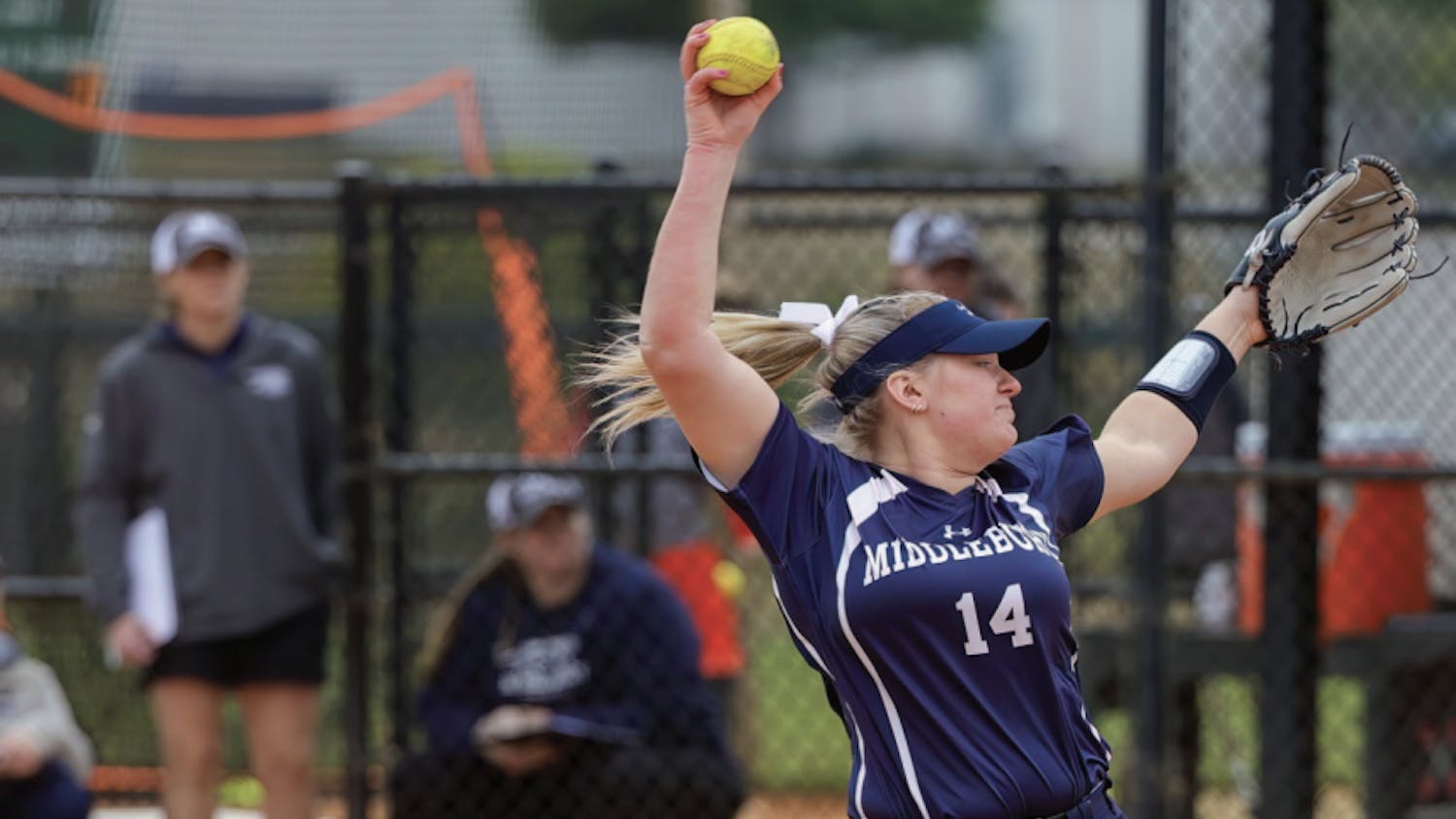On Saturday, May 27, after The Campus had wrapped for the semester and most Middlebury students had packed up and headed home, Lubo Cuba ’19 spent his morning dominating Claremont-Mudd-Scripps’ Nikolai Parodi en route to the first NCAA DIII singles title in program history. A few hours later, Cuba teamed up with William de Quant ’18 to secure the DIII doubles crown, another Middlebury first, with a resounding victory over Herman Abban and Pawel Jaworski from Carthage. Now three months from that date, with the dust completely settled, we sat down with the pair to take another look at their historic seasons.
If a Just God exists — and, moreover, if he has a vested interest in the outcome of athletic competition at the Division III level — he was probably smiling down on Chattanooga, Tenn., on a late May afternoon as Lubo Cuba ’19 and William de Quant ’18 left the championship court with a pair of national titles under their arms.
You’d be hard-pressed to find a pair of more deserving young men: hardworking, passionate and fully cognizant of how fortunate they’ve been to arrive at their current position.
Sit them down separately, and you’ll see just how different athletic excellence can look in two individuals. De Quant, one of this year’s senior captains, has the demeanor of a confident and vocal leader: Born in France but having grown up all across Europe before finishing high school in Florida, he gives the impression of someone who’d be comfortable in any situation in which you could think to place him, and then some.
Cuba, on the other hand, guards a quiet fire behind a playful but somewhat shy countenance, exactly what you might expect from someone who left behind the glamour of a highly visible, top-25 Division I program — the University of Michigan — to chase a national championship on a lower-profile Middlebury team that, in many ways, is just as competitive.
Get the pair of them in the same room, and it becomes clear that the two have spent more than a little time together as the No. 1 doubles team for the Panthers.
De Quant began, looking back on the season as a whole: “We had a rough patch of two or three weekends in a row where we didn’t do great. But I think we always knew that —”
“— we had a chance to win it all,” Cuba interjected with a smile before sitting back and allowing his teammate to continue.
“We had a chance to win it all,” de Quant repeated. “We knew that, if we played well and up to our capabilities, we had a chance to win. As a Middlebury team, we have the knowledge that we can win and that if we do the work the right way, if we have our heads on the right way, and if luck turns our way on the day, we should be able to win.”
Don’t be surprised if you couldn’t tell whether he was referring to Cuba and himself as individual players, as a doubles pair, or to the entire Middlebury team that spent most of last season at No. 1 in the DIII rankings. Sometimes, it’s unclear as to whether de Quant himself knows. To hear him tell it, he’s at his best when he’s just another player in a Middlebury uniform — unconscious of whether he’s playing in a team match or for an individual championship.
“It’s a different sport when you’re on a team,” he explained. “You’re playing for a different thing, the motivation is different. I think that helps a lot of players grow and develop: being part of a team where you’re on the sidelines, you’re cheering for them. And when you’re actually on the court playing, you’re not playing for yourself. You’re playing for a point on the team.
“The team culture matters a lot to me specifically, because I came in without a lot of confidence on the court. I didn’t have too many good results in Juniors [the individual tournaments in which high-level players compete before college]. But when I came in to the team and bought into the culture of Middlebury tennis, that’s when I started hitting my stride and getting some results.”
That Middlebury tennis has an exceptional team culture is beyond doubt, at least from Cuba’s perspective. And he would know as well as any, having spent a season getting regular playing time for the Michigan Wolverines. He didn’t miss a beat when asked to draw a comparison between his time in the Midwest and in New England.
“I think the team here is closer,” Cuba offered. “We definitely do more together, on and off the court, which is great to see. And I think that definitely contributes to our success.
“Honestly, the training is pretty much the same hours — the last three days, I think we’ve played four hours a day. . . . I don’t think at Michigan we played four hours on a Saturday.”
Of course, more factored into his decision than the number of hours he’d be spending on the court. “The main reason I transferred was, first, to get that more diverse education that Midd offers,” he continued; “second, to compete for national titles. And look, we got them in singles and doubles, but the team title is more important, and hopefully we can get that this year.”
That “team title,” the NCAA Division III Team Championship, is perhaps that to which de Quant was referring earlier, when he spoke of his confidence in Middlebury’s chances every year, every weekend, every time they take the court. As a team, the Panthers have qualified for the NCAA tournament for the past 16 years in a row, winning it all twice and finishing within the top four in each of the last four seasons. Their coach, Bob Hansen, has accrued the most DIII team championships in the history of the sport between his time at Middlebury and at the University of California–Santa Cruz.
So it’s hardly surprising that the Panthers expect themselves to be there every year, and that they’re not fully satisfied with anything less. It’s hardly arrogant for Cuba and de Quant to feel at least some disappointment on account of the team’s semifinal loss to Claremont-Mudd-Scripps (CMS for short), even though the two brought home their fair share of NCAA titles.
Nevertheless, excellent players handle both victory and defeat with aplomb.
“Coach Hansen always likes to remind us,” de Quant said, “there’s a difference between winning a national championship, and being a championship team. Last year, we were a championship team, which we weren’t expected to be for a while. So last year was very difficult. We didn’t achieve the ultimate goal of winning an NCAA team championship, but a lot of guys, a lot of guys made big jumps, and there were a lot of individual highlights.
“I think that we should still kind of be proud of the work we put in,” he concluded, as if genuinely worried that he ought to think otherwise.
“Having Lubo come in from Michigan and, in his first year at Middlebury, do what he did? It’s a testament to the year that we had as a team, as a group, because he wouldn’t have been able to do it without everyone else’s effort pushing him and making sure that he continued to play well, too. . . . It was a tough ending, losing that NCAA championship and the Nescac championship, but there were still a lot of really good things to say about the year.”
The game of tennis requires an extraordinary amount of concentration and precision, at a very quick pace, over the course of a match that can stretch out for quite some time. As a general rule, letting one’s focus slip is detrimental. Wasting time focusing on the wrong thing almost always proves fatal. Given how Cuba and de Quant bounced back from the team’s postseason losses — to Bowdoin in the Nescac finals in early May, and to CMS in the NCAA tournament — it’s hardly shocking that the pair already had some experience dealing with adversity during the regular season.
Cuba described the pair’s even-handedness with an appropriately casual affect. “I think that was one good thing that we did,” he said of the team’s brief mid-season woes, “we never looked too far ahead. You know, when we had that rough patch, we kind of just said, ‘Oh, let’s go get a top-four ranking so we can make the tournament.’
“And then once we got in the tournament, in the first round we were down a set, and we were like ‘Let’s just get through this first round.’ It was just little by little, and then we were in the finals and we played what I think was our best match yet.”
When pressed to elaborate on the details of those setbacks, Cuba turned to de Quant with a wry smile.
“You talk about Nescacs,” he said, with an air of deferral.
“I wonder why you’d say that,” de Quant fired back.
Cuba shrugged. His expression became serious, even sympathetic.
“Well, you lived it the most.”
Some background: The year prior, Middlebury and Bowdoin had faced off in the Nescac championship. Although Middlebury came away with the conference title, the Polar Bears had the last laugh when they defeated the Panthers in the 2016 NCAA championship, 5–0. But Middlebury had been victorious in their 2017 regular-season matchup; as the Nescac finals approached, both teams were bracing themselves for a hard-fought contest.
With good reason. Recalling how the match played out, de Quant didn’t mince his words. “We lost 5–4. Last match on, at 4-all — I was actually playing the last match on at No. 2 singles. Split one set apiece. And literally, the last set to decide the match in the Nescac final, it just went his way.
“I didn’t play that well in that last set. He played well. He was solid; he’s a very good player. That’s just kind of the way things turn out sometimes. It was gut-wrenching, because you have your team on the side, cheering you on, you have their expectations and their hopes riding on you, right? So I think that for me, that was tough — losing that, feeling like I dropped the ball for the team.”
Then, as though he were correcting himself: “I don’t think we read too much into that.”
Cuba knew exactly where his partner was going. “No,” he picked up, “I mean, we rebounded fine, the team got through regional NCAAs pretty comfortably. And honestly, even the match we lost in the semis against CMS, I still think was under control. We were up 3–0 after doubles, and every match we lost in singles. I lost with five in the third, we had a couple people lose with six in the third, 7–6, 7–6. I mean, every match was tight, it could’ve gone either way.
“Unfortunately, it didn’t go our way that day.”
You might wonder how Cuba can call a match that he lost “under control.” But he’s a little more qualified than most players to say so, given how many of his matches do go his way. Of the 32 singles matches he played to the finish last season, Cuba only lost three. He was only slightly less consistent playing doubles with de Quant, dropping a whopping six out of 30 matches.
So when a player of Cuba’s stature says he’s got things “under control,” opponents would do well to take note. Nikolai Parodi, the No. 1 singles player for CMS whose win over Cuba in that NCAA semifinal helped bounce the Panthers from the tournament, found out the hard way a few days later how scary Cuba can be when things are going his way. To say that the then-sophomore cruised his way to the finals would be an understatement: he didn’t drop a single set en route. And when he met Parodi in the championship match with a chance for revenge, well, those who were hoping for something resembling their last encounter were sorely disappointed.
Perhaps his own post-match reaction would speak to how effortless the victory was for Cuba. “For singles,” he recalled hesitantly, “obviously I was super happy that I won, but I don’t think I really showed it — as much as I maybe should have?”
A better explanation: “He won his match in 37 minutes,” de Quant broke in. “He didn’t show that much emotion because it was 6–1, 5–1.” If there was traffic in Chattanooga, you might’ve missed the match entirely.
“It was a good week,” Cuba admitted, sheepishly.
But for some reason, the doubles final a few hours later garnered a different reaction from Cuba. “I just felt a lot happier to win doubles — maybe because I had you on the court also with me,” he said, turning to de Quant. “And . . . I don’t know, just that match point when we won it — I was just a lot happier after the doubles one.”
It wouldn’t be out of the question. De Quant admitted to being pretty emotional himself, for a number of reasons. Obviously, as the consummate teammate, part of it was the joy of watching Cuba succeed alongside him with the knowledge that he’d helped him to get there. But part of it had to do with de Quant’s own tennis history.
“It was very special for me because my parents were there,” he began. “I’ve played a lot of tennis for a long time, and my parents have always been very, very invested. . . . And it’s always been kind of a difficult road. I never did that well.
“And so for them to. . . .” He stopped. “I was just unbelievably happy. I was over the moon, because I had finally won something big. And kind of proven to myself that I was capable of doing something like that.
“So for my parents to be there,” he went on, the words coming more easily, “sharing that moment with them was very special, and that made it extra-special for me. And having Bob [Hansen] there as well, patting me on the back and telling me, ‘This was not a surprise to me whatsoever’ — well, it was really a bit of a surprise to me when it happened.
“Going in,” he summarized, “we knew that there was kind of a chance for us to make history with Middlebury never having won an individual title before. We wanted to do that not just for us, but for the program, and for Bob, who had tried so hard and put so much work into the program. He really wanted it as well, so it was also for him.”
Hansen is entering his seventh season as the Middlebury head coach. To hear his players talk about him, you’d imagine he’s the sort of man they’ll be telling their grandchildren about.
At times, the stories of his commitment and dedication border on the comical. “The man could talk for five hours straight about tennis,” said de Quant with a chuckle before quickly adding, “which is a good thing.”
Cuba jumped right in with a grin. “He’ll tell us before practice that he couldn’t sleep last night because he was thinking too much about the direction the team’s heading — always just to better the team, whatever it takes to get us better, he’s always thinking about us first.”
But as the two went on, the impact Hansen has had on them became even more eminently apparent. “You can take the No. 14 guy on the team, technically the worst player on the team, put him on the bottom court against some other player. You could have the best two players on the team playing on the first court, and Bob will go up to the guy, the No. 14 guy, and sit him down and talk to him about his game. He’ll have watched a lot of the match, he’ll have comments, he’ll have feedback on how to build his game. I mean, he cares about every one of the guys, and he is so invested in everyone’s growth.
“And he doesn’t just recruit good tennis players — he wants to recruit someone that he knows will bind to the culture and that he can teach and that he can help grow. He’s spent decades being a leader and a father figure for college guys, and he really cares about us. . . . I don’t know if it hurt him or us more when we lost that match in the NCAA semifinals, because he cares so much about the guys — I’ve never seen anyone as passionate about tennis and the team as he is.”
Cuba hardly remembered his own reaction after his singles title, but he certainly remembered his coach’s. “It was funny,” he said; “I told him before the match that I really wanted one of those NCAA hats that they were selling. And he was like, ‘If you win, I’ll buy you one.’
“And the first thing when I saw him after the match, he had bought me the hat. And he was just as happy as I was.”
It’s hard not to expect success with a man such as Hansen at the helm; with the reigning singles and doubles champions on the team in Cuba and de Quant, it’s nearly impossible. But the players don’t need anyone else to tell them that they’re capable of capturing the NCAA team championship. They can visualize it for themselves.
“I think ending the season the way we did,” said de Quant, “getting those two championships, really set the tone for this next year. They’re obviously individual successes, but having Lubo set his mark the way he did in singles —”
With impeccable timing, Cuba jumped in to correct him: “The fact that we’re both returning players on top of our recruiting class… On top of getting Noah [Farrell, an extremely talented player in his own right who took the 2016–2017 season off] back, I think this is the year to win it.”
“We’ve been close, every time,” de Quant enunciated, “with Noah, and with Lubo, and having the class that we have, we’re going to have all the pieces this year to take it to the house. We’ll keep our heads down and work as much as we can, and hopefully the pieces fall in the right way.”
Smart money wouldn’t bet on them falling any differently.




